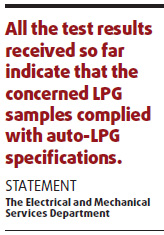Sinopec tests find no LPG problems
Updated: 2010-02-03 07:25
By Joy Lu(HK Edition)
|
|||||||
HONG KONG: Hong Kong-listed mainland energy giant Sinopec has defended the quality of its liquefied petroleum gas (LPG) by announcing the results of independent tests yesterday, following allegations by drivers that their vehicles had problems after filling their tanks at Sinopec petrol stations.
Its first media briefing over the suspected engine-stalling problem of its product, Sinopec (Hong Kong) Petrol Filling Station Co said testing by an independent lab showed the LPG supplied at Sinopec filling stations meets the government standards.
The Electrical and Mechanical Services Department started to receive complaints against Sinopec LPG from taxi and minibus drivers in September, who said they experienced frequent breakdowns after refueling at Sinopec LPG stations. Vehicle operators believed the impurities, found in their engine filters during repair, were caused by dirty Sinopec fuel.

The situation worsened in December when hundreds believed their vehicles had been affected. They stopped refueling at Sinopec, which owns seven of the 12 dedicated LPG stations in Hong Kong, exhausting the supply at rival stations. The government set up a task force to look into the problem in January.
As part of the probe, the government took random samples of Sinopec LPG on January 7 - at its Tsing Yi terminal and a Tai Po filling station - and sent them to a German lab and the Huizhou lab for testing.
Sinopec replicated the exercise through SGS in its own probe. It had wanted to send the samples to the German lab, but the samples' container, although up to code, was not registered with any airline and, accordingly, couldn't be sent via air, he explained.
The company's own investigation has so far found no problem either with the LPG from the supplier or the company's local operation. Chan Fu-shing, a specialist with LPG Transport Management and Installation Inspection, said that many factors could have caused the engine stalling problem, including the parts used and the aging of the vehicles.
Since Hong Kong promoted the use of LPG in the late 1990s, thousands of taxis and minibuses have been driven for more than five years, he said.
EMSD yesterday issued a statement reporting that it had received all the results of laboratory tests conducted on the mainland and some of the results of tests conducted in Germany.
"All test results received so far indicate that the concerned LPG samples complied with auto-LPG specifications," EMSD said in the statement.
(HK Edition 02/03/2010 page4)